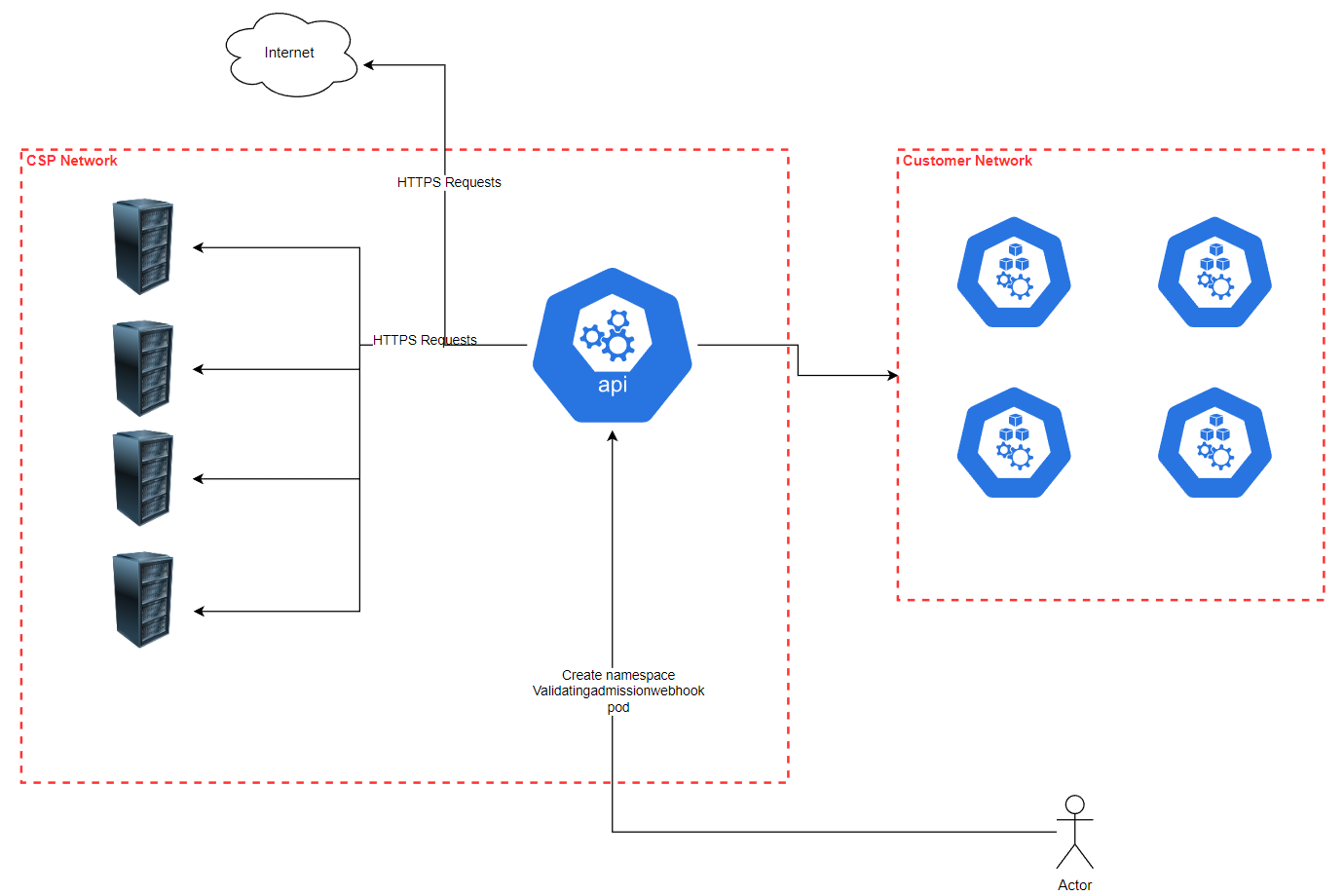This is a Proof of concept idea for using the Kubernetes API server as a port scanner via SSRF. This is a very simple PoC and is not intended to be used in production!
There are a couple of objects in the Kubernetes API which take a parameter of a URL or service object, which cause the API server to make requests, and they can return errors if the request fails. This can be used to scan for open ports on hosts that the API server can reach.
From a security perspective, to use this you need considerable rights to the Kubernetes API, so it's not likely to be a huge concern, although it does mean, in managed Kubernetes environments, you can port-scan the CSP network. Obviously, we'd expect their security architecture to be pretty good, so port scanning shouldn't reveal anything sensitive :)
It looks a bit like this
This is the initial idea I've implemented. Validating admission webhooks take a service object or URL parameter as part of their configuration and then call that service or URL whenever a matching operation occurs.
Obviously, from a cluster availability perspective, we want to scope down the webhooks sphere of operations so it doesn't disrupt the cluster you're scanning, so what we do is create a namespace with a specific name and then have the webhook only look at create pod attempts in that namespace.
Then, when we try to create a pod in the namespace, the error message that is returned gives us information about the service or URL that the API Server tried to call.
The sequence of events is:
- Create a namespace called
ssrfscannerwith a random suffix (to avoid collisions if it's run multiple times and the namespace from a previous run is still terminating) - Create a validating admission webhook that only looks at pods in that namespace (to avoid disrupting the cluster). The target URL for the webhook is the target host/port that have been specified.
- Try to create a pod in the scanner namespace. We're expecting this to fail, as there's no webhook server listening on the target host/port.
- The API server calls the target host/port specified in the webhook configuration
- The target host/port returns an error, as there's no webhook server listening there (or it's not reachable from the API server and the network stack is returning an error)
- The API server returns the error to the user.
sequenceDiagram
participant clusterAdmin
participant kubernetesAPIServer
participant targetHost
clusterAdmin->>kubernetesAPIServer: 1. Please create a namespace
clusterAdmin->>kubernetesAPIServer: 2. Please create a vadlidating admission webhook pointing at targetHost
clusterAdmin->>kubernetesAPIServer: 3. Please create a pod in the ssrfscanner namespace.
kubernetesAPIServer->>targetHost: 4. Hey is this pod OK?
targetHost->>kubernetesAPIServer: 5. Error there's no webhook server here
kubernetesAPIServer->>clusterAdmin: 6. There was an error trying to do that, here's the details
I'm trying to catch various cases of error, so we clean up after ourselves. The code does the following:
- Check if the namespace exists, if not create it
- Check if the webhook exists, if it does delete it, if not create it.
- Create a pod in the namespace
- Check the error message returned by the API server when it tries and fails to call the target admission webhook
- Return this to the user after interpreting the error for what it indicates
- Delete the webhook and the namespace
k8s-ssrf-portscanner vwebhookscan is the command to run the validating webhook scanner. This will (by default) target 127.0.0.1:443 (from the perspective of the API server). You can change the target with -t and the port with -p. Also if you want to generate a different namespace than the default (ssrfscanner) you can use -n.
You can also scan a range of hosts on a specific port using the -r switch. This will scan the range of hosts on the port specified with -p. The range is specified in CIDR notation, so for example -r 192.168.1.0/24.
At the moment we scan individual ports on individual hosts or a range of hosts on one port. Obviously it would be better to scan a range of ports on a range of hosts, so we'd need to take the range and then iterate over the scanning process for each one.
Also reporting is just to STDOUT right now, it could be made more useful with JSON output.
It would be good to add a faster timeout to the webhook, to speed up scanning. Realistically a couple of seconds should do in most cases.
